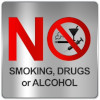 The background to this document states that: "As the prevalence of alcohol-impaired driving decreases, and as more jurisdictions decriminalize or legalize cannabis, it is increasingly important for policy makers to have accurate information on the prevalence and pattern of drug driving."
The background to this document states that: "As the prevalence of alcohol-impaired driving decreases, and as more jurisdictions decriminalize or legalize cannabis, it is increasingly important for policy makers to have accurate information on the prevalence and pattern of drug driving."
The abstract goes on to explain "This study uses “left-over” blood taken as part of routine medical care to quantify cannabis and other drugs in non-fatally injured drivers who present to participating emergency departments after a collision. Toxicology testing is done with waiver of consent as we have procedures that prevent results from being linked to any individual. These methods minimize non-response bias and have the advantages of measuring drug concentrations in blood obtained shortly after a collision."
Vancouver, New Westminster, Victoria and Kelowna are part of this study.
The document, Epidemiology of drug driving: protocol from a national Canadian study measuring levels of cannabis, alcohol and other substances in injured drivers includes Dr. Jeff Brubacher, an Associate Professor at the University of British Columbia, as one of the authors, and explains how the study can be applied elsewhere to provide the accurate information that policy makers require.
- Log in to post comments
